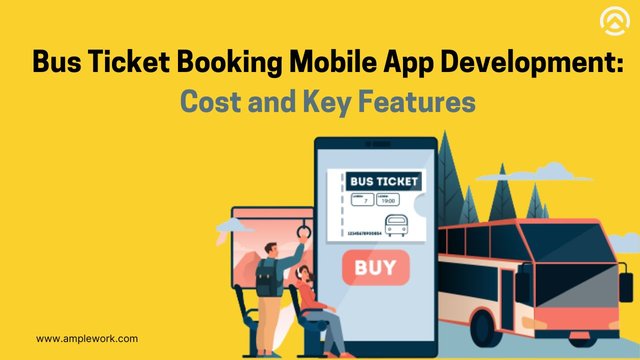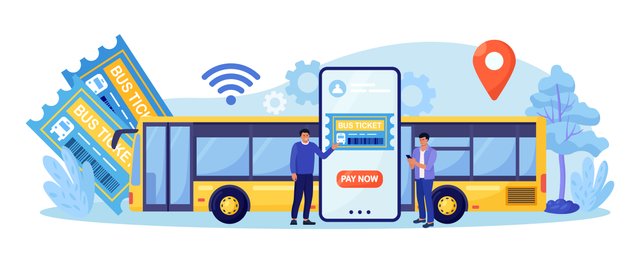
In the rapidly evolving world of travel app development, mobile applications have revolutionized the way we live and travel. One such application that has gained immense popularity is the bus ticket booking app. With the convenience it offers, users can easily book bus tickets, check schedules, and manage their travel plans with just a few taps on their smartphones.
According to statista, the travel segment of the app market is expected to experience steady revenue growth from 2023 to 2027, with a total increase of 731.4 million U.S. dollars, representing a significant growth rate of 59.32 percent. This tremendous growth is a testament to the increasing reliance on mobile apps for simplifying travel-related tasks.
To cater to the rising demand for seamless travel experiences, bus ticket booking apps have emerged as a game-changer. By leveraging the power of technology and connectivity, these apps provide users with a hassle-free way to plan and execute their bus journeys.
A bus ticket booking travel mobile app Development involves a series of crucial considerations, including design, functionality, and cost. While the exact cost may vary depending on various factors such as features, complexity, and development resources, investing in a well-designed and feature-rich app can yield significant benefits for both users and businesses.
Understanding the Cost Factors
Developing a mobile app involves various factors that contribute to the overall cost. The cost estimation of a bus ticket booking app depends on the complexity of the features, the platform(s) targeted (Android, iOS, or both), the development approach (native or hybrid), the design complexity, and the development team's hourly rate. Here are the key cost factors to consider:
App Design: A visually appealing and user-friendly design is crucial for the success of any mobile app. The cost will vary based on the complexity of the design, including the number of screens, graphical elements, and animations.
Development Approach: Native app development requires separate codebases for each platform (Android and iOS), resulting in higher travel app development costs. Hybrid app development, on the other hand, allows developers to write code once and deploy it on multiple platforms, reducing costs.
Features and Functionality: The more features you incorporate into your app, the higher the development cost. Key features include ticket booking, seat selection, payment integration, real-time bus tracking, push notifications, customer support, and social media integration.
Third-Party Integrations: If you plan to integrate external services like payment gateways, mapping services, or SMS gateways, additional costs may be incurred depending on the complexity and licensing fees.
Testing and Quality Assurance: Rigorous testing is essential to ensure a bug-free and smooth user experience. The cost will vary based on the scope and complexity of testing, including functional testing, performance testing, and security testing.

Key Features of a Bus Ticket Booking App
To make a bus ticket booking app successful and user-friendly, it should incorporate several key features. Let's explore some of the essential features:
User Registration and Login: Users should be able to create accounts, login securely, and manage their profiles. This feature enables personalized experiences, booking history, and faster transactions.
Search and Booking: Users should be able to search for bus routes, view available buses, select seats, and book tickets seamlessly. The app should display relevant information such as departure/arrival times, ticket prices, and available amenities.
Multiple Payment Options: Offering a variety of payment options such as credit/debit cards, mobile wallets, and net banking enhances user convenience. Integration with secure payment gateways is crucial to ensure the safety of transactions.
Seat Selection: Users should be able to choose seats from an interactive seat map. This feature provides a visual representation of available seats and helps users select their preferred seating arrangement.
Real-time Bus Tracking: Integrating GPS tracking allows users to track the location of their bus in real-time. This feature helps users plan their travel and estimate arrival times accurately.
Booking Management: Users should have the ability to view and manage their bookings, including ticket cancellation, rescheduling, or printing e-tickets.
Push Notifications: Real-time updates such as booking confirmations, seat availability, and departure reminders can be sent to users through push notifications. This feature keeps users informed and engaged.
Ratings and Reviews: Enabling users to provide feedback and rate their travel experience helps build trust and assists other users in making informed decisions.
Customer Support: A robust customer support system is essential for addressing user queries, handling complaints, and providing assistance. Integrating a chatbot or a help desk feature can enhance the user experience and improve customer satisfaction.
Social Media Integration: Integrating social media platforms allows users to log in with their social media accounts, share their travel experiences, and invite friends to use the app. This feature helps in expanding the user base and promoting the app.
Multilingual Support:Offering multilingual support ensures that users from different regions can access and use the app comfortably. It enhances the user experience and makes the app more inclusive.
Offline Access: Incorporating offline access allows users to view previously booked tickets, access schedules, and receive notifications even without an internet connection. This feature is especially useful during travel when network connectivity may be limited.
Loyalty Programs and Offers: Implementing loyalty programs, discounts, and promotional offers encourages user engagement and increases customer retention. Rewarding users for their loyalty can help in building a strong user base.
Analytics and Reporting: Incorporating analytics and reporting features allows app owners to gather data on user behavior, booking trends, popular routes, and revenue generation. This data can be utilized to make informed business decisions and improve the app's performance.
Read more: How Much Does It Cost to Develop a Flight Booking App?
Conclusion
In the realm of travel booking app development, creating a bus ticket booking mobile app necessitates careful consideration of cost factors and a focus on key features that enhance the user experience. The cost of development depends on several variables, including design complexity, development approach, features, and third-party integrations. To ensure a seamless and user-friendly experience, it is essential to incorporate vital features such as user registration, search and booking functionality, multiple payment options, seat selection, real-time bus tracking, and reliable customer support.
By understanding the intricacies and cost involved in travel app development and partnering with skilled travel app developers, businesses can successfully create a bus ticket booking app that caters to the needs of modern travelers. With the right blend of functionality, convenience, and user-centric design, these apps have the potential to revolutionize the way people plan and execute their bus journeys, providing a remarkable travel experience for all users.